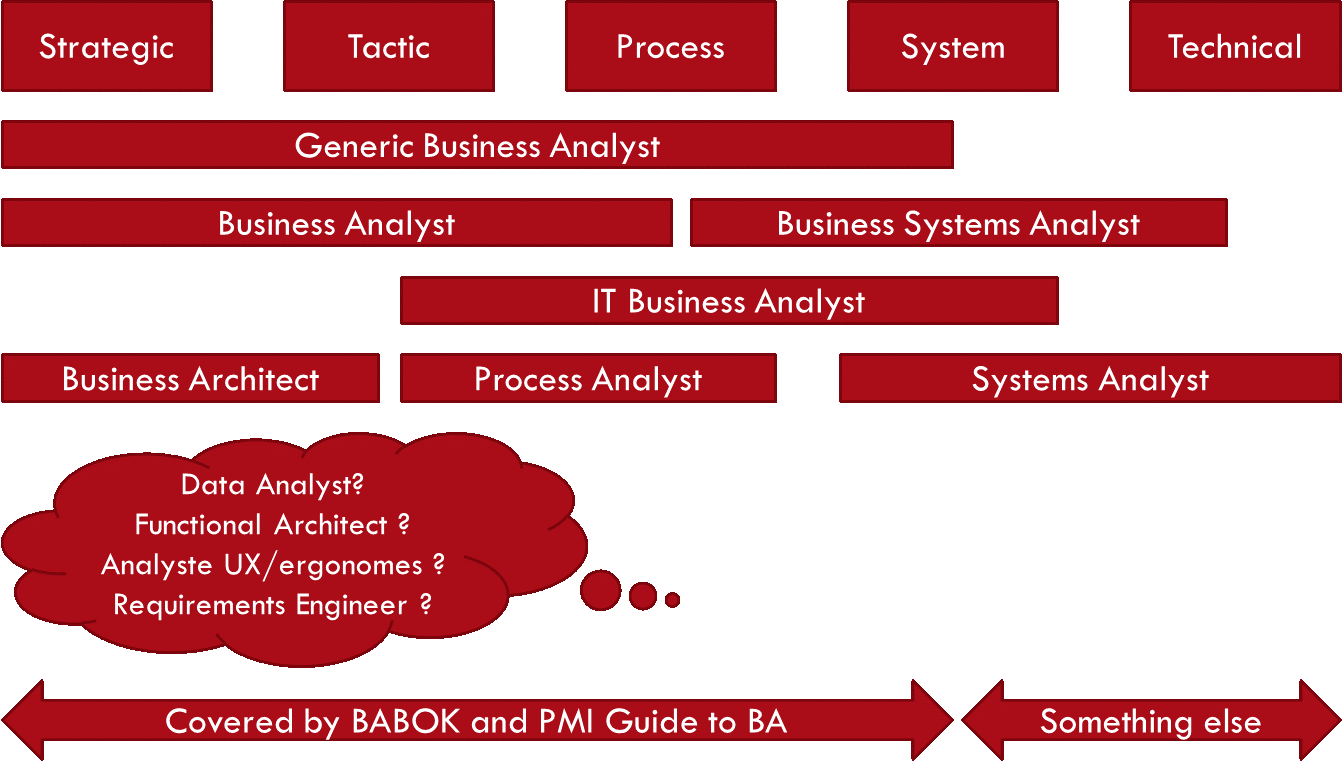BA career
The business analysis career path is not a straight line. Many roads lead to it. And it can lead to many different places. Some of the most common difficulties in identifying a career path are: What type of training or background does it require? What are the job opportunities?
What type of training or background does it require?
Although you will find several universities and schools offering degrees in business analysis, there is no formal training required to become a business analyst. Instead, organizations rely on certifications to validate candidates’ qualification. Two independent organizations offer certifications: the IIBA (iiba.org) and the PMI (pmi.org).
But, in general, business analysts come to that role through a natural progression in their work. Business analysts tend to start out with either strong business or IT skills.
Often, an understanding of a specific industry or vertical market will be an advantage at the start. For this reason, professionals in human resources, telecommunications or manufacturing will transition to a business analyst career because of their involvement in projects.
Business analysts also come from an IT background. Many experienced developers use their communication, analysis, and data mining skills to successfully transfer from software development to business analysis, and their in-depth knowledge of the software development life cycle can be a definite advantage.
But whether you come from an IT or business background, you will have to learn skills and you will have to learn how business analysis is performed. Once you have mastered the skills, you will be able to consider moving to the next steps.
What are the job opportunities?
The following titles are commonly attributed to business analysts :
Although some of these roles are vastly different, they all share the same toolkit and they are all performed with the same mindset. For more information about what these roles are, read this article
If you put all these roles together, you might wonder who does what. Here is an attempt to an answer:

Remember that these roles are not regulated. Organizations will implement them as they wish. Recent studies have shown that these roles (no matter how they are defined in any specific organization) are in demand:
- Canadian employers will need 171,000 business analysis related professionals by 2016.
- (Source: Information and Communications Technology Council, 2011)
- American employers will need 876,000 business analysis related professionals by 2020.
- (Source: U.S. Bureau of Labor Statistics, Employment Projections Program)
It’s easy to imagine that, given the span of the business analysis role in general, the more techniques one masters, the better the chances of finding a suitable role in the organization.
The work
In practice, junior BA will perform more traceability and the senior BAs will deal more with tactical and strategic issues. The closer you get to the strategic, the more your BA people skills will serve. Tactical and strategic issues tend to be a lot more sensitive and require plenty of soft skills to handle.
Career path
Junior BA
Junior BA will typically assist the senior business analyst in gathering, validating and documenting the requirements. Junior BA will maintain and verify requirements specifications once the requirements baseline is established.
Senior BA
The Senior Business Analyst is involved with strategic business analysis with the business partners. The BA will work closely with the business in order to gain an in-depth understanding of the business strategy and the context in which the business operates. The senior BA’s role is key to understanding the capabilities needed and the changes required.
The Senior Business Analyst will review business processes to identify and address operational, financial and technological risks and opportunities. They might be leading small to mid-size projects, taking charge of the Business needs and the solution scope on larger more complex projects.
BA Manager
BA Manager will coach his BA team, he will help define best practices and will help the Business Analysts plan their career. He will also coordinate resource allocation with the project teams.
Certifications
The IIBA has lots of information on how to become a Business Analyst or to improve your knowledge.
Click here to go to the IIBA.org web site and learn about how it can help you advance your career.
Evaluate your competencies with LCG Solution by contacting us at info@lcgsolution.com
IIBA Certifications
The IIBA offers four levels of certification:
Level 1 – ECBA
Recognizes individuals entering the field of business analysis.
Level 2 – CCBA
Recognizes BA professionals who have 2-3 years of business analysis experience.
Level 3 – CBAP
Recognizes BA professionals who manage and lead with over 5 years of business analysis experience.
Level 4 – CBATL
Recognizes BA professionals who advance the BA profession and have over 10 years of experience.
PMI Certification
The PMI offers its own certification. The PMI recognizes that the BA role is central to projects in order to deliver value and maintain the focus on the right solution.
